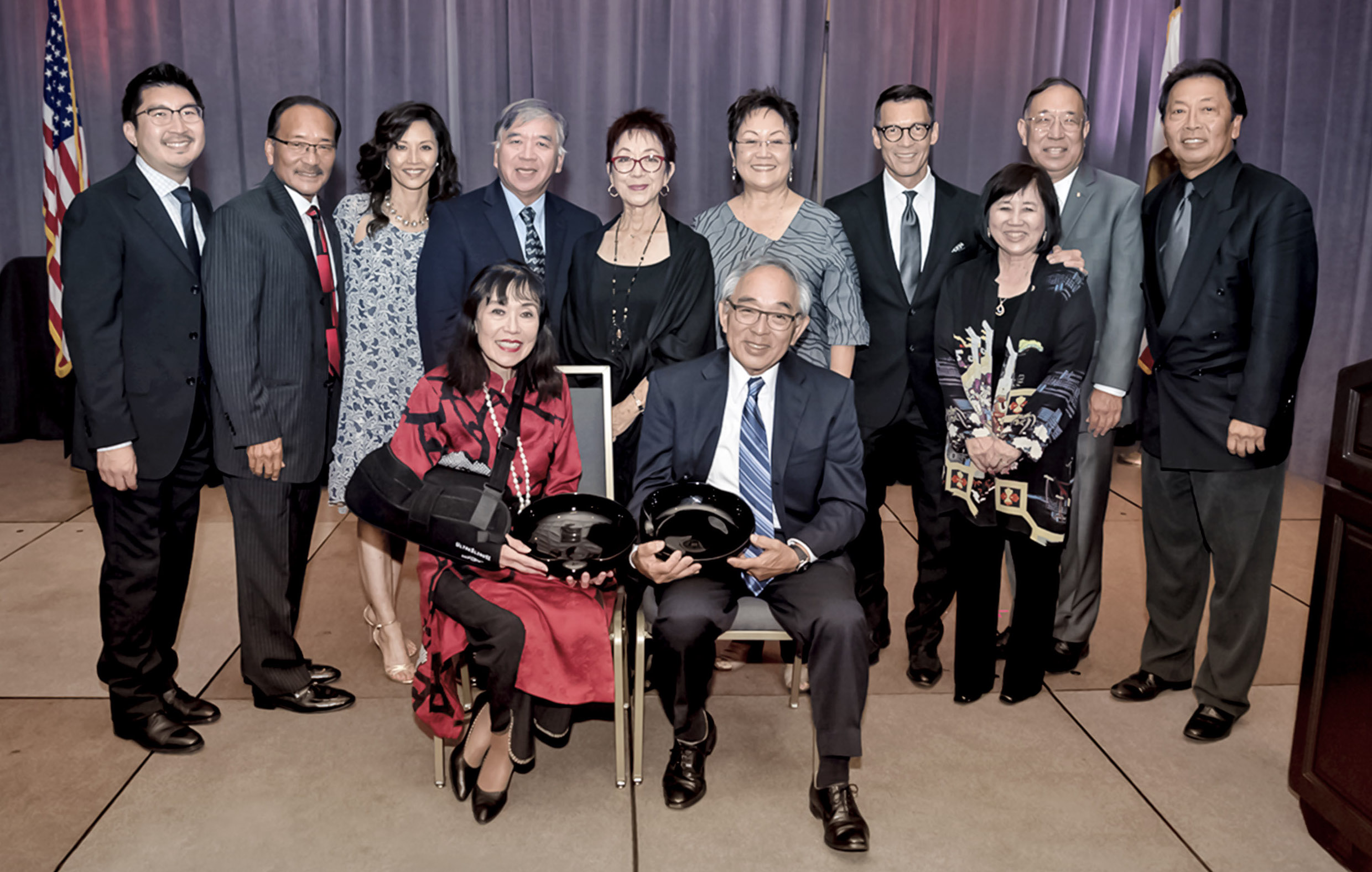To mark the 30th anniversary of the enactment of the Civil Liberties Act of 1988, the San Diego JACL Chapter held a gala and honored those who helped with the passage of the historic legislation. (Jade Coast Photography)
The chapter honors redress campaigners and former incarcerees.
By P.C. Staff
With Aug. 10 marking the 30th anniversary of President Ronald Reagan’s signing of the Civil Liberties Act of 1988 still a fresh memory, the San Diego chapter of the JACL held its annual gala dinner on Sept. 15 at the Town and Country San Diego with the apropos theme: “Never Forget, Justice for All.”
The fundraising dinner proved to be a way to spend an evening to reflect and remember the achievement that was Japanese American Redress, while feting those who helped in its grassroots efforts and legislative success. It was also an evening to continue to keep alive the lessons experienced by West Coast Japanese Americans during World War II, as well as honor some of those who lived in American concentration camps for Japanese Americans.
In addition, it was an opportunity to revisit a critical, risky and then-controversial tactic upon which, moving forward, the Redress Movement would use as its foundation, namely the Commission on Wartime Relocation and Internment of Civilians hearings.
On hand to receive their individual recognitions were John Tateishi (Civil Rights Lifetime Achievement Award) and Karen Korematsu (Civil Rights Leadership Award), as well as Arthur Nishioka, Kay Ochi and Jan Tokumaru, who each received a Civil Liberties Award from the San Diego JACL. (Tokumaru’s husband, Dennis Kobata, who was absent from the ceremony, also had his name on their award.)
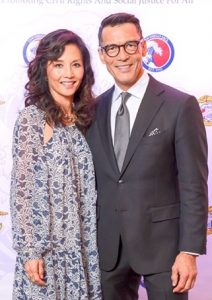
Gala co-emcees Tamlyn Tomita and David Ono (Photo: Jade Coast Photography)
But prior to that, the approximately 275 people in attendance at the event, facilitated by actress Tamlyn Tomita and KABC-TV news anchor David Ono, were treated to the Pledge of Allegiance by Kiele Clancy and Maiya Ito, the singing of the national anthem by Alessa Morales, an opening prayer by Rev. Ichibei Honda (San Diego Japanese Christian Church) and greetings from San Diego JACL Chapter President Michael Kurima.
Recognized as winners for an essay competition were Zoe Yamamoto (high school) and Maya McHale (college). The audience also saw excerpts from two documentaries by filmmaker Lane Nishikawa, “Our Lost Years,” which is in final postproduction and is poised to be screened for Veterans Day in San Diego, and an in-production documentary about the JACL titled “League of Dreams.” (See below.)
The evening also feted more than two dozen San Diego-area denizens who spent time locked up in federal concentration camps during WWII, with each receiving applause from the audience and a physical memento of their experience, a glass vial, marked “Poston, Arizona, 1942-1945,” containing soil from the site.
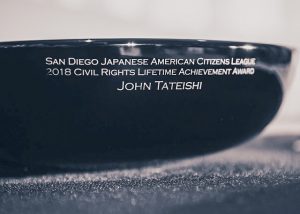
A close-up shot of the inscription on John Tateishi’s award (Photo: Jade Coast Photography)
The gala’s top award went to Tateishi, who was appointed by then-JACL National President Clifford Uyeda to be the national chair of the JACL’s Redress Committee in 1978. He was introduced by Pacific Southwest District Gov. Carol Kawamoto, and she described Tateishi as a man who was at the time “relatively new to JACL” — but who had proven himself at the chapter level. “Not many people can work with three generations of opinions, community activists, grassroots organizations and politicians. His stewardship of the redress campaign led to its success in 1988, 10 years later,” Kawamoto said. “JACL made a good choice, and tonight he’s our choice,” she continued. In addition to his award, Tateishi was also presented with a commendation from San Diego City Councilmember Barbara Bry, representing District One.
Tateishi began his remarks recalling a childhood during which he spent ages 3-6 growing up at the Manzanar WRA Center. Even then, he realized something odd, that “we were surrounded by armed military guards” and that there were white people who came into the camp and would leave at the end of the day. “We stayed,” Tateishi said. “We always stayed.”
“The day that we left Manzanar, my father said to me and my three brothers, ‘Never forget this place. It’s important for you to remember it, and if at some point in your life you have an opportunity to do something about this, to make it right, it’s your obligation to your family, to the community and to the country,’” Tateishi recalled.
He carried that message with him into adulthood, but admitted feeling trepidation upon becoming involved with JACL, since in his home the organization was “not a happy subject.”
But Tateishi joined anyway because his friend, Edison Uno, told him, “If something’s going to happen, it’s going to happen in the JACL because we have the structure, we have the networks, we have the associations for something like this.”
According to Tateishi, the JACL Redress Committee’s decision to pursue a strategy that would undergird the Redress Movement going forward, namely forming what would become the Commission on Wartime Relocation and Internment of Civilians, was “one of the most unpopular decisions the JACL ever made.
“Half of the organization turned against us,” Tateishi continued. “The community turned against us, and the accusations against me were it was [Mike] Masaoka in ’42 with cooperation and in ’78-’90 it’s Tateishi with the Commission,” he said. “It was a really risky decision, and I knew that as we made that decision because what it depended on was for the Nisei to break the years of silence that protected their psyches.”
From his experiences meeting resistance, even in liberal San Francisco, when discussing the concept of internment and redress with the general public, Tateishi also knew that “until we educated the American public, we could never get a bill through.”
Although he noted that pursuing the Commission strategy “could have failed enormously,” he knew it was necessary. Fortunately, in the Senate was Daniel Inouye and in the House, Norman Mineta.
“They were the ones who protected the Commission bill,” Tateishi said, referring to the legislation that would be signed by President Jimmy Carter in 1980 to create the CWRIC. “That was the turning point.”
In an interview with the Pacific Citizen after the event, Tateishi said that getting the Commission bill through Congress was difficult, even though it was actually quite innocuous.
“It did nothing more than establish a commission to study. That’s all it did. But even with that, we were meeting with all kinds of resistance,” he said. “It was the Commission bill that really set the course for what redress would become. It was the first time this country ever addressed an issue that way, so it was a pretty incredible bill to get through, even though it’s long forgotten. It’s the bill that opened the door for us to finally get in there.
“We would not have ever gotten redress without everything entailed in that Commission function — the hearings, the exposure, the publicity, the change in the public’s attitude, public opinion. My mantra was ‘convince the public, and you can convince Congress,’” he said.
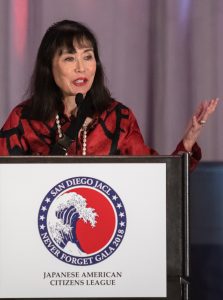
Karen Korematsu speaks after receiving her award. (Photo: Jade Coast Photography)
Upon receiving her award, Korematsu — the daughter of Supreme Court and coram nobis litigant Fred Korematsu — thanked the San Diego JACL for thinking of her.
“I feel I am my father’s living voice, and it gives me the opportunity to really carry on the charge that he gave me about five months before he passed away at the age of 86 — now it’s up to me to carry on with education because he didn’t want something like the Japanese American incarceration to happen again,” said the founder and executive director of the Fred T. Korematsu Institute.
Korematsu expressed how she was stunned and saddened by the June 26 Supreme Court decision in Trump v. Hawaii, in which the high court reversed an appeals court decision that President Trump’s Presidential Proclamation 9645 — the so-called travel ban —exceeded his powers, but also repudiated the 1944 Supreme Court case Korematsu v. United States.
“I knew my father would be so disappointed that all that work that he had put into, that we were still repeating history,” she said. Karen Korematsu also said she “became outraged” by the decision. “It just energized me to make a commitment to further education through the Korematsu Institute,” she said.
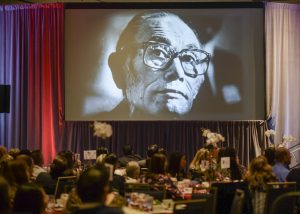
This image of Fred Korematsu was projected on a large-screen monitor as his daughter, Karen Korematsu, addressed the audience. (Photo: Jade Coast Photography)
With that and under the current political climate, Korematsu said, “The JACL, to me, as an organization, is more important than ever. We need to have that seat at the table to make sure that others know our story so that we can uphold other communities, the communities that are being marginalized.”
Ochi, active with Nikkei for Civil Rights & Redress for 37 years, recalled how one of the first hurdles to the Redress Movement was convincing many Japanese Americans about the necessity of redress.
“They wanted to be gaman and forget about the past. It took a lot of education within our own community,” she said. Ochi also cited the importance of the CWRIC testimony.
She recalled the 1981 hearings in Los Angeles when “153 brave Japanese Americans . . . came forward and spoke about what happened during wartime.” Calling it both “heartbreaking and mind-blowing,” Ochi said the testimony “opened the floodgates and really sparked the movement.” She also made a “shameless plug” for recordings of the testimony and a new book titled “NCRR: The Grassroots Struggle for Japanese American Redress and Reparations,” both of which are available for purchase at the Japanese American National Museum in Los Angeles’ Little Tokyo.
Another NCRR elder, co-founder Tokumaru, also cited the power of the CWRIC testimony she witnessed in Los Angeles, which was one of 10 cities where hearings took place.
“There’s nothing that was in my life that I can say was more transformative,” Tokumaru said. “It was people pouring out all the pain, the suffering, but also all the strength. It was so invigorating and at the same time heartbreaking,” she said, adding that the 30th anniversary of redress is a reminder of “how much work there is to do.”
Nishioka, who has served on the boards of the San Diego JACL and the Pacific Southwest District, gave thanks to the fictional character of “The Karate Kid’s” Mr. Miyagi, who was played by actor and former incarceree Pat Morita; JACL Legislative Education Committee leader Grayce Uyehara, who “worked diligently to lobby the halls of Congress to persuade members of Congress to support this bill”; and Rudy Tokiwa, a 442nd Regimental Combat Team veteran whose participation in the “Rescue of the Lost Battalion” paid off decades later when the presence of the war-injured former soldier in Congress during debate over redress helped compel the Texas delegation to “vote in favor of redress and reparations.”
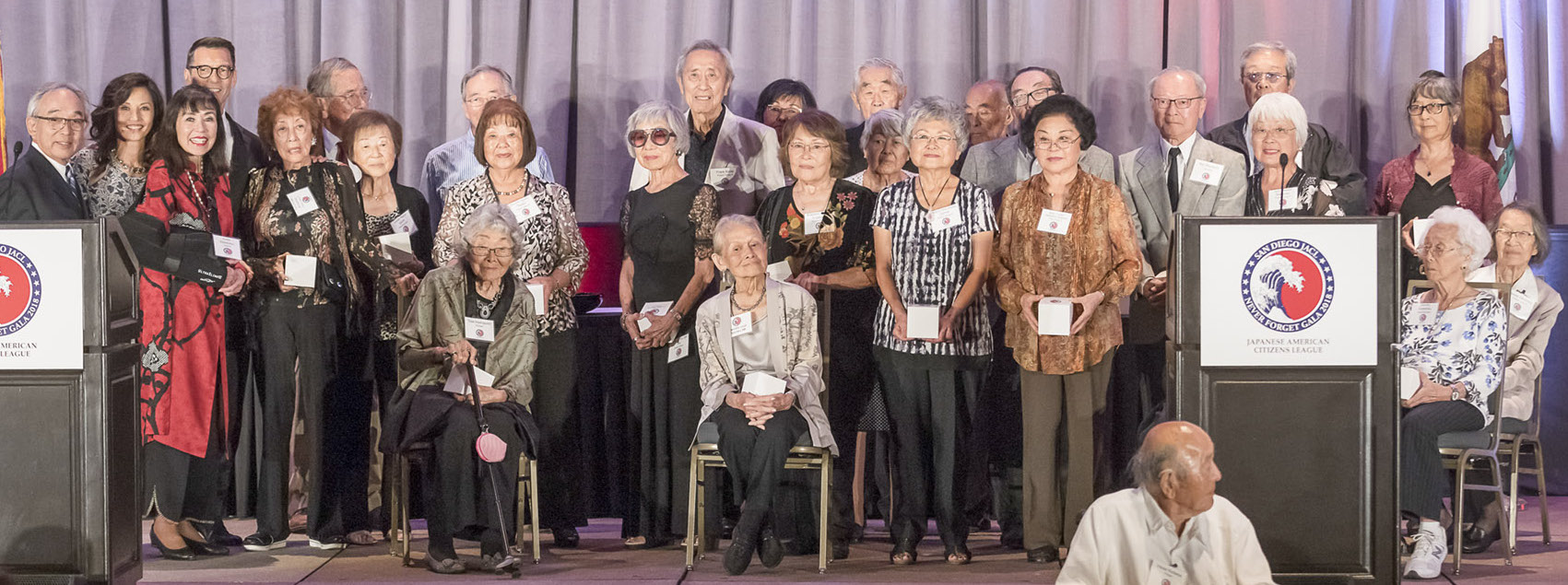
The San Diego JACL gala recognized and honored 25 surviving San Diego-area residents who were incarcerated at one of the camps operated by the War Relocation Authority during WWII. (Photo: Jade Coast Photography)
◊◊◊
Lane Nishikawa’s ‘Our Lost Years’ and ‘League of Dreams’ Footage Screens at Gala
One of the crowd-pleasing features of the San Diego JACL chapter’s “Never Forget, Justice for All” gala was the inclusion of clips presented on large screens with amplified audio from a pair of documentaries by Lane Nishikawa, who helped produce the event as a member of the gala’s planning committee.
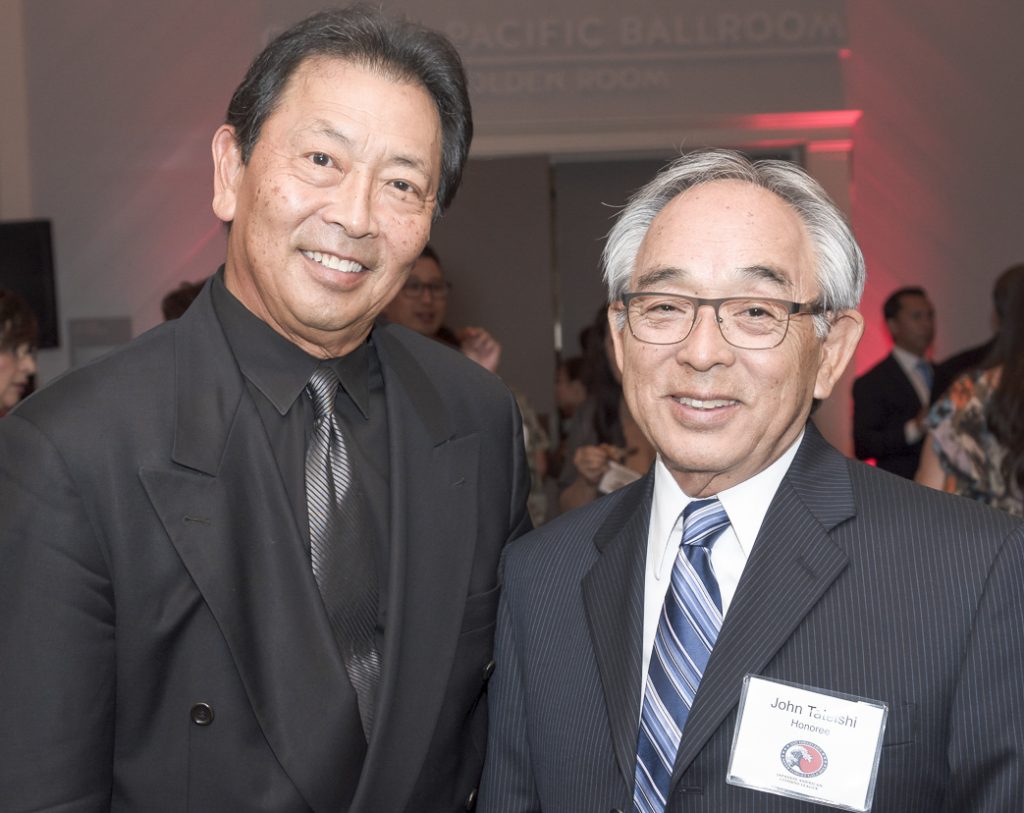
Filmmaker/San Diego gala planning committee member Lane Nishikawa (left) with gala honoree John Tateishi (Photo: Jade Coast Photography)
One documentary was the almost-finished “Our Lost Years*,” a feature-length movie that, more than 75 years later, examines the direct and indirect effects of President Franklin D. Roosevelt’s 1942 Executive Order 9066 on Japanese Americans who were alive then — and on their descendants.
The other is the still-nascent “League of Dreams,” Nishikawa’s independently financed documentary on the JACL. According to Nishikawa, “League” — which in its preview featured several front pages of the Pacific Citizen from years gone by — began as an idea he had two years ago.
“What this is, is a historical look at all this organization has done,” said Nishikawa, who noted that JACL is set to celebrate its 90th year in 2019. “I cannot think of a time that is more important than what our country is going through right now, with immigration, travel bans, racial profiling, hate crimes — everything that Japanese have experienced since we got here to this country. It’s happening again and again and again.”
One thing Nishikawa wants to make clear is that the JACL is not financing “League of Dreams.”
“I want to help JACL, but I don’t want them to foot the bill,” he said. Nishikawa also wants to retain artistic and editorial control that might appear to be compromised otherwise. “I’m trying not to ask JACL chapters or the organization itself, but I will seek individuals who believe in the story and believe in the future.”
To help fund “League,” Nishikawa said he is submitting an application to ITVS, the funding arm of PBS. Crowd-sourced funding via the Internet — something that didn’t exist when he produced his indie 442nd Regimental Combat Team movie “Only the Brave” — is also an option.
Regardless, Nishikawa is determined to go for broke and get “League of Dreams” completed and share the JACL’s story to a larger audience.
As for why he has taken on that task, he said, “What I really respect about the JACL is its strength to stand up.”
Information on how to contribute funds to help Nishikawa finish the documentary “Our Lost Years” can be found at tinyurl.com/ycol37cc.
◊◊◊
San Diego Gala Recognizes San Diego-Area Former Incarcerees
Among the proceedings of the “Never Forget, Justice for All Gala” was the recognition of 25 surviving victims of Executive Order 9066, who spent time incarcerated at one of the camps operated by the War Relocation Authority during WWII.
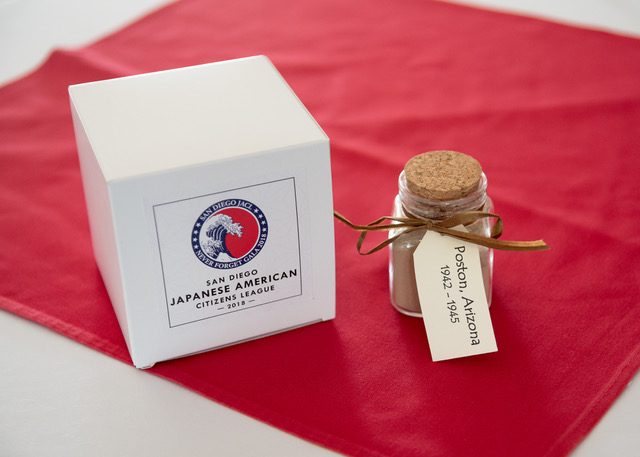
A vial of soil from one of the three WRA Centers in Poston, Ariz. (Photo: Jade Coast Photography)
Each of the former incarcerees listed below received a vial of soil from Poston, Ariz., to keep as a reminder of the injustice they endured lest it happen again to another group of Americans.
One of the highlights was the audience singing “Happy Birthday” to Oscar Kodama for this 92nd birthday. The eldest among those so honored was Dorothy Yonemitsu, 100.
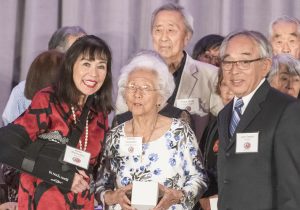
Pictured (from left) are Karen Korematsu, 100-year-old Dorothy Yonemitsu, who was incarcerated at Heart Mountain during World War II, and John Tateishi. (Photo: Jade Coast Photography)
The list of those recognized is as follows: JoAnn Yoshioka Allen (Poston Camp 3), Taye Hashiguchi (Rohwer), Louise Nagao Iguchi (Heart Mountain), Kenji Ima (Minidoka), Setsuo Milton Iwashita (Poston Camp 3), Oscar Kodama (Poston Camp 3), Frank Koide (Poston Camp 3), Tami Koide Kinoshita (Poston Camp 3), Linda Marumoto McLemore (Poston Camp 3), Wayne Miyahara (Heart Mountain), Ken Miyamoto (Gila River), Judy Owashi Miyamoto (Poston Camp 3), Dorothy Iguchi Otsuka (Poston Camp 3), Ayako Linda Oya Seu (Poston Camp 1), Kathleen Suyenage (Poston Camp 1) Allyne Marumoto Tachiki (Poston Camp 3), Hesaa Takahashi (Poston Camp 3), Ikuko “Cookie” Takashima-Taniguchi (Poston Camp 3), Grace Kaninaka Tsuida (Poston Camp 3), Dorothy Uno (Poston), James Uyesugi (Rohwer), Doris Takeguchi Wada (Poston Camp 3), Frank Mitoshi Wada (Poston Camp 3), Hank Takashi Wada (Poston Camp 1) and Dorothy Yonemitsu (Heart Mountain).

